|
|
|
Sort Order |
|
|
|
Items / Page
|
|
|
|
|
|
|
| Srl | Item |
| 1 |
ID:
184788
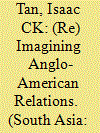

|
|
|
|
|
| Summary/Abstract |
From December 1922 to February 1929, two Englishmen, Lieutenant-Colonel John Champion Faunthorpe and Arthur Stannard Vernay, led six expeditions to the Indian subcontinent to collect animal specimens for the newly refurbished American Museum of Natural History in New York City. This article argues that the Vernay-Faunthorpe Expeditions were an expression of a new form of Anglo-American relations that engaged the language of scientific knowledge in maintaining Western hegemonic influence in the early twentieth century. Inspired by genuine scientific objectives as much as by aspirations to reassert Western hegemony in a time of rising nationalism and declining imperial influence, this timely collaboration reimagined imperialism beyond territorial expansion, but in the discursive spaces of indigenous nature and wildlife exhibitions.
|
|
|
|
|
|
|
|
|
|
|
|
|
|
|
|
| 2 |
ID:
079232
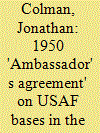

|
|
|
|
|
| Publication |
2007.
|
| Summary/Abstract |
The article explores the 1950 'Ambassador's Agreement' (named after US Ambassador Lewis Douglas) about establishing long-term US air bases in the UK. During the discussions British representatives expressed resentment of American pressure and were concerned about the expense that developing the bases for American purposes might entail. There were even fears that Washington might use the airfields to launch an atomic bomb attack on the USSR without regard to the views of the UK government. The British consented to providing the bases because they wanted to enmesh the US further in UK and Western European defence. For their part American negotiators had wanted to further US atomic strategy without delay. Although the agreement imposed no restriction on the use of the airfields, some US officials believed that in a crisis the UK government might try to prevent them being used for atomic bombing missions.
|
|
|
|
|
|
|
|
|
|
|
|
|
|
|
|
| 3 |
ID:
151845
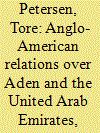

|
|
|
|
|
| Summary/Abstract |
The British decision to withdraw from Aden in 1967 was a political decision made because of Labour's distaste for imperialism and empire. As Aden descended into chaos and disorder, the Americans watched with equanimity; accepting an increased Soviet and Chinese presence in the Federation after British withdrawal. Later, the Nixon administration supported British attempts to federate tiny Arabian sheikhdoms on the tip of the Arabian Peninsula into the United Arab Emirates (UAE). The main American concern was for Britain to hand over the Tunbs and Musa Islands to the Shah of Iran whom Nixon had anointed American shieldbearer in the Gulf. This the British willingly did in order to secure access to the lucrative Iranian market, while at the same time the Heath government succeeded in creating the UAE.
|
|
|
|
|
|
|
|
|
|
|
|
|
|
|
|
| 4 |
ID:
068854
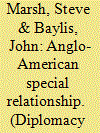

|
|
|
| 5 |
ID:
142219
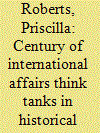

|
|
|
|
|
| Summary/Abstract |
This essay surveys the operations of foreign policy think tanks, and how they have functioned to create transnational knowledge networks, since their emergence in the early twentieth century, around the First World War. It discusses how patterns of linkages among foreign policy think tanks changed and evolved over time, and were linked to broader Anglo-American, imperial, and internationalist networks and relationships, and to the changing international political climate and configuration. It suggests some ways in which think tanks contributed to Cold War interchanges between different states, especially to Soviet bloc–Western relations and Asian–Western relations. It concludes by discussing the recent proliferation and frequent globalization of foreign policy think tanks, and suggests how such trends may develop in future.
|
|
|
|
|
|
|
|
|
|
|
|
|
|
|
|
| 6 |
ID:
129676
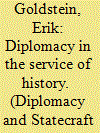

|
|
|
|
|
| Publication |
2014.
|
| Summary/Abstract |
In 1898 Governor William Bradford's early history of the Plymouth Colony was returned to Massachusetts through diplomatic, and sub-diplomatic, efforts. This marked an important stage in the growing Anglo-American rapprochement. It also illustrates an early episode of Cultural Diplomacy, as well as of repatriation of a cultural object.
|
|
|
|
|
|
|
|
|
|
|
|
|
|
|
|
| 7 |
ID:
068857
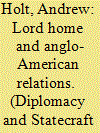

|
|
|
| 8 |
ID:
134623
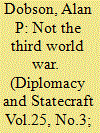

|
|
|
|
|
| Summary/Abstract |
Whilst the British and Americans expended blood and treasure together in the Kuwaiti desert in 1991, bureaucratic blood from both sides was also visible on carpets in London and Washington. The reason was attempts to replace the access to Heathrow airport of two failing airlines, Pan American World Airways and Trans World Airlines, with American and United Airlines. This succession rights affair was one of the most difficult diplomatic negotiations ever on civil aviation between the United States and Britain. How and why that controversy developed, its resolution, and what impact on, and feedback from, the broader Anglo–American relationship that it had are the main concerns of this analysis.
|
|
|
|
|
|
|
|
|
|
|
|
|
|
|
|
| 9 |
ID:
092069
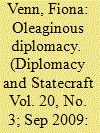

|
|
|
|
|
| Publication |
2009.
|
| Summary/Abstract |
There has been considerable controversy as to the significance of oil in the Lausanne Conference of 1922-1923, in particular British attempts to retain Mosul as part of Iraq. However, as this article explores, the conference also had important implications for the composition of the British-registered Turkish Petroleum Company, which was expected to win the Iraqi oil concession. In the first phase of the conference, the United States observer delegation's stance persuaded the British Government to put pressure upon the British companies involved in the TPC to admit American companies upon the latter's terms. Despite this, in the second phase, the Americans supported the Turkish delegation in its opposition to clauses in the proposed Treaty, which would have guaranteed the rights of the TPC, and forced a British compromise on the issue. The Lausanne Conference played a significant role in the Anglo-American "oil war" of the inter-war period.
|
|
|
|
|
|
|
|
|
|
|
|
|
|
|
|
| 10 |
ID:
105357
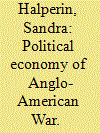

|
|
|
|
|
| Publication |
2011.
|
| Summary/Abstract |
This article relates the Anglo-American invasion of Iraq to fundamental aspects of Anglo-American political economy, including the increasing integration of the British and US economies, and the largely Anglo-American-led project of global economic restructuring currently taking place. Part I discusses the political economy of UK-US relations and the evolution of an Anglo-American military-industrial conglomerate. Part II links the Anglo-American relations and interests detailed in the first part of the article to an on-going project of global reconstruction. With this as a context, Part III reviews the history of British and US foreign policies towards Iraq and the culmination of these policies in the invasion of the country. The conclusions draw implications for the overall nature and direction of current trends of change.
|
|
|
|
|
|
|
|
|
|
|
|
|
|
|
|
| 11 |
ID:
077784
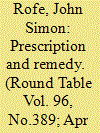

|
|
|
|
|
| Publication |
2007.
|
| Summary/Abstract |
The aim of this article is to consider the approach to, and solution adopted by, Lord Lothian, British Ambassador to Washington, to what President Roosevelt referred to at the end of January 1940 as a "minor crisis" in Anglo-American relations. His prescription reflected a long held Atlanticist belief that saw cooperation between the USA and Great Britain as a guarantor of security, a carefully managed profile, and an understanding of American public opinion. The ambassador's remedy to the 'minor crisis' over US perceptions of British abuse of neutral rights meant utilizing personable relationships with key figures in Washington and explaining British policy in straightforward terms. Crucially also for the resolution of the minor crisis, Lothian was able to articulate that importance of American opinion to those making British foreign policy in London. That his views were heeded in London is testament to his efforts and the pertinence of his prescription, which saw him become the pre-eminent conduit in Anglo-American relations during the first half of 1940
|
|
|
|
|
|
|
|
|
|
|
|
|
|
|
|
| 12 |
ID:
144526
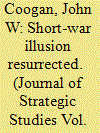

|
|
|
|
|
| Summary/Abstract |
Nicholas Lambert argues that in 1912 Britain believed it had developed an economic warfare strategy that promised a quick and bloodless victory in the event of war against Germany. This article scrutinises this argument and demonstrates that its evidential and methodological flaws render it untenable.
|
|
|
|
|
|
|
|
|
|
|
|
|
|
|
|
| 13 |
ID:
185162
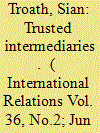

|
|
|
|
|
| Summary/Abstract |
Studying trust at the international level is one of the greatest challenges for trust studies. In this article I seek to expand on work which has sought to study trust between states in a way which avoids anthropomorphising the state, and retains the salience of interpersonal trust. To do this, I consider trust between states as existing in a web of relationships, from relationships between government figures, to military personnel, to members of society. In this article I demonstrate the value of incorporating actors beyond leaders in the most minimal sense: through including boundary spanners, those whose relationships and interactions span across boundaries, whether those boundaries be state borders or segments of government and society. Furthermore, I seek to begin a process of categorising the types of roles that boundary spanners can play in the development of trust between states. To illustrate their impact, I deploy a multidimensional approach to trust which is used to assess the relationship between leaders, and the impact of intermediary figures on both trust between the leaders, and in the relationships developed between the intermediary and their respective leader. One case study is used to exemplify the utility of this approach: the relationship between Harold Macmillan and John F. Kennedy and their respective official ambassadors David Ormsby-Gore and David Bruce.
|
|
|
|
|
|
|
|
|
|
|
|
|
|
|
|
|
|
|
|
|